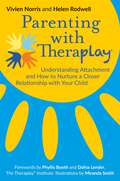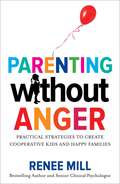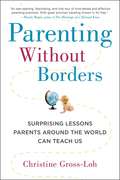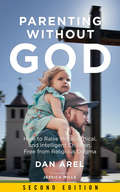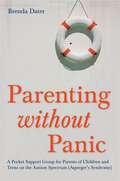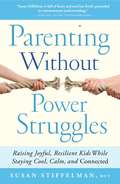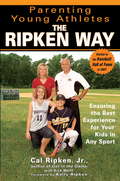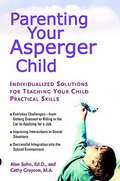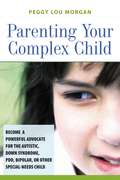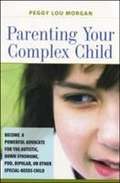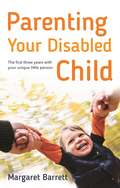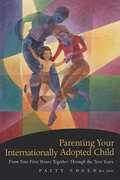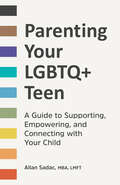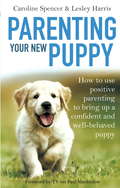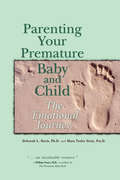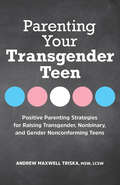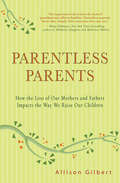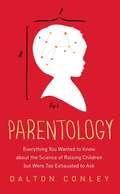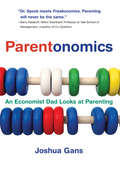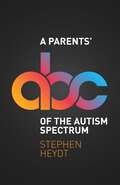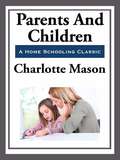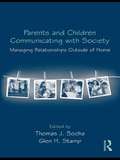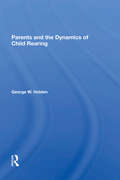- Table View
- List View
Parenting with Theraplay®: Understanding Attachment and How to Nurture a Closer Relationship with Your Child
by Dafna Lender Dr Vivien Norris Helen Rodwell Miranda Smith Phyllis BoothTheraplay® is an attachment-focused model of parenting that helps parents to understand and relate to their child. Based on a sequence of play activities that are rooted in neuroscience, Theraplay offers a fun and easy way for parents and children to connect. Theraplay is particularly effective with looked after and adopted children. By providing an overview of Theraplay and the psychological principles that it is based on, parents and carers will gain an understanding of the basic theory of the model along with practical ideas for applying Theraplay to everyday family life. Through everyday case studies and easy language, parents will gain confidence and learn new skills for emotional bonding, empathy, and acceptance in the relationship with their child.
Parenting with Theraplay®: Understanding Attachment and How to Nurture a Closer Relationship with Your Child
by Helen Rodwell Dr Vivien Norris Phyllis Booth Dafna Lender Miranda SmithTheraplay® is an attachment-focused model of parenting that helps parents to understand and relate to their child. Based on a sequence of play activities that are rooted in neuroscience, Theraplay offers a fun and easy way for parents and children to connect. Theraplay is particularly effective with looked after and adopted children. By providing an overview of Theraplay and the psychological principles that it is based on, parents and carers will gain an understanding of the basic theory of the model along with practical ideas for applying Theraplay to everyday family life. Through everyday case studies and easy language, parents will gain confidence and learn new skills for emotional bonding, empathy, and acceptance in the relationship with their child.
Parenting Without Anger
by Renee MillAs parents, we all want happy children. Ideally, we’d like to bask in the fun and camaraderie of family life, find it easy to love our children unconditionally and have them love us in return. Right? But when everyday activities like waking up on time, getting dressed, eating breakfast or sitting quietly in the car can turn your home into a hotbed of anger, yelling and daily punishments, we’re guessing your dream of a happy, contented home and well-behaved kids is proving difficult. Know you are not alone – many of you report that you are more stressed, more tired and more angry with your children than ever before. In this essential book for modern parents of both children and teenagers, bestselling author and senior clinical psychologist Renee Mill shares practical and easy-to-apply solutions that will help you manage your own anger, so you can successfully implement techniques that will create the contented home, and happy, cooperative family, of your dreams.
Parenting Without Borders: Surprising Lessons Parents Around the World Can Teach Us
by Christine Gross-LohAn eye-opening guide to the world's best parenting strategiesResearch reveals that American kids lag behind in academic achievement, happiness, and wellness.<P><P> Christine Gross-Loh exposes culturally determined norms we have about "good parenting," and asks, Are there parenting strategies other countries are getting right that we are not? This book takes us across the globe and examines how parents successfully foster resilience, creativity, independence, and academic excellence in their children. Illuminating the surprising ways in which culture shapes our parenting practices, Gross-Loh offers objective, research-based insight such as:Co-sleeping may promote independence in kids."Hoverparenting" can damage a child's resilience.Finnish children, who rank among the highest academic achievers, enjoy multiple recesses a day.Our obsession with self-esteem may limit a child's potential.est for children and why. Among her eye-opening findings: Co-sleeping, typical in most of the world's families, may promote independence in kids. American-style "hoverparenting" is unique in the world and can damage a child's resilience. Finnish children, who rank among the world's highest academic achievers, enjoy multiple recesses a day. Our obsession with self-esteem--a concept that doesn't exist in many countries--may limit a child's potential At last bringing empirical research to the debate, Parenting Without Borders offers new and provocative thinking on the secrets to raising a confident and capable generation.
Parenting without God: How to Raise Moral, Ethical, and Intelligent Children, Free from Religious Dogma
by Dan ArelThis practical guide—written with humility, compassion, and understanding—helps parents teach their children about standing up to religious proselytization and recognizing all forms of discrimination that hamper human dignity and democracy. It's for parents who wish for their children to question everything and reach their own conclusions based on verifiable evidence. Above all, Arel makes the argument that parents should lead by example—both by speaking candidly about the importance of secularism and by living an unabashedly secular life.
Parenting without Panic: A Pocket Support Group for Parents of Children and Teens on the Autism Spectrum (Asperger's Syndrome)
by Brenda DaterEver wish that parenting a child or teen on the autism spectrum came with instant access to a support group? Brenda Dater has provided parents with exactly that. In this book she draws on her extensive experience as a support group leader and parent of a child on the spectrum to offer trusted advice and tried-and-tested solutions to parents' top concerns, all in an accessible and easy-to-read format. Filled with the voices of other parents in the same situation, the book covers everything from the first steps to take after diagnosis, to advocacy and disclosure, behavior, building independence and resilience, making friends, holidays and vacations, homework, supporting siblings, how to garner support from extended family and friends, and how parents can look after their own wellbeing. This book extends the vital lifeline of a support group to parents of children and teens on the autism spectrum everywhere.
Parenting Without Power Struggles: Raising Joyful, Resilient Kids While Staying Cool, Calm, and Connected
by Susan StiffelmanDo you ever find yourself asking . . . • How can you get your children to do their homework without meltdowns, threats or bribes? • How can you have a drama-free morning where the kids actually get out the door in time for school? • How can you better manage your kids’ screen time without making them want to hide what they’re doing from you? Family therapist Susan Stiffelman is here to help. While most parenting programs are designed to coerce kids to change, Parenting Without Power Struggles does something innovative, showing you how to come alongside your children to awaken their natural instincts to cooperate, rather than at them with threats or bribes, which inevitably fuels their resistance. By staying calm and being the confident “Captain of the ship” your child needs, you will learn how to parent from a place of strong, durable connection, and you’ll be better able to help your kids navigate the challenging moments of growing up. Drawing upon her successful practice and packed with real-life stories, Parenting Without Power Struggles is an extraordinary guidebook for transforming the day-to-day lives of busy parents—and the children they love.
Parenting Young Athletes the Ripken Way
by Rick Wolff Cal RipkenSince he retired from baseball in 2001, Cal Ripken, Jr., has devoted his time to coaching kids, including his own son and daughter, who play baseball and basketball, among other sports. With a baseball league of nearly 700,000 kids, ages 5-12, named for him, he has also had a chance to meet and work with countless young athletes. Cal Ripken's simple yet effective philosophy for helping kids get the most out of playing sports is to keep it simple, explain the "why," celebrate the individual, and make it fun! But Ripken is troubled by what he sees in youth sports: a competitive intensity that removes the element of fun from playing. Now, drawing on his experiences as a father, a player, and a coach to his charges at his youth baseball based organization, Ripken Baseball, the legend offers his insights and advice on how to approach organized sports with your kids to ensure they have the best experience possible, stay fit, and enjoy themselves. Whether you were a star player or a kid who never learned to throw, this book will tell you everything you need to know about sports parenting from the pre-school years to middle school. It covers all the bases, including: Teaching the basics of sportsmanship How an overemphasis on technique or winning can harm your child's game How to develop a good relationship with your child's coach The pros and cons of travel teams and club teams The importance of returning the games to the kids and how best to behave as a parent The latest on performance and nutrition Fun games and exercises to do with your kids to encourage them Why most kids burn out on team sports by middle school and how to avoid it Few athletes embody sportsmanship and fair play as perfectly as Cal Ripken. His advice will inspire confidence in kids and parents alike.
Parenting Your Asperger Child
by Cathy Grayson Alan SohnAsperger's Syndrome is a form of autism--but with the right guidance, these children can go on to live happy, fulfilling lives. In Parenting Your Asperger Child, Dr. Alan Sohn's and Cathy Grayson's groundbreaking Cognitive Social Integration Therapy (CSIT) offers practical solutions that help parents prepare their children for a fulfilling life of social interaction outside the confines of their syndrome, addressing such topics as: - The six characteristics of Asperger's Syndrome - How to identify a child's type of Asperger's--and the best approaches for dealing with it - Understanding how an Asperger's child sees and interprets the world - Replacing inappropriate coping techniques with productive skills - How to survive and learn from a crisis - How school programs can aid in teaching Asperger children - Making changes that last
Parenting Your Complex Child: Become a Powerful Advocate for the Autistic, Down Syndrome, PDD, Bipolar, or Other Special-Needs Child
by Peggy MorganBesides the usual parenting challenges, parents of disabled children face added obstacles that can tax the resolve and resources of even the strongest families. Peggy Lou Morgan has developed a powerful system for obtaining dramatically better care for children with one or more serious disabilities. Parenting Your Complex Child reflects the experience and knowledge she has gained through decades of navigating a sea of complex medical, educational, occupational, and social issues while working with disabled clients and with her own son. Morgan's unique tracking and documentation tools let parents adapt to their child's challenges, create routines that support the child's needs, communicate those needs to busy professionals -- and be taken seriously by them. The book also helps parents lay the groundwork for care to continue after they themselves can no longer provide it. Compassionate, practical, and proven, Parenting Your Complex Child helps parents ensure that life-changing decisions are based on the best interests of the child -- and on the best information available.
Parenting Your Complex Child: Become a Powerful Advocate for the Autistic, Down Syndrome, PDD, Bipolar, or Other Special Needs Child
by Peggy Lou MorganMorgan describes ways to parent children with special needs, particularly in communication, adaptation, and communicating with those who can help. She first recounts her experiences with her son, who is multiply disabled, then provides suggestions for working with doctors, tracking day-to-day behavior, schedules and routines, documentation, using service dogs, getting professionals to listen, creating a community, and hiring caregivers. The appendix consists of sample forms and lists. The book is aimed at parents of children with behavior disorders, developmental problems, autism, Down syndrome, bipolar disorder, schizophrenia, ADHD, pervasive development disorder, and others. There is no bibliography. Morgan has worked extensively with special-needs children and their families.
Parenting Your Disabled Child: The First Three Years
by Margaret BarrettIf you or someone you know has a child with disabilities, this book is for you. Whether the problem is picked up in pregnancy or after birth, or is a result of an accident or of sudden illness Parenting Your Disabled Child takes you through the emotional roller coaster of diagnosis, to coping strategies for babies and toddlers with developmental delay, sensory impairment or learning difficulty. The cause of the disability might be brain damage, a genetic or chromosomal disorder, metabolic disease, traumatic injury, or damage after illness, such as post-meningitis, while conditions may include autism, Down syndrome, attention deficit disorder, hyperactivity, dyslexia, and a host of others. The book has therefore a wide range, but the emphasis remains on the child, rather than the disability. It’s important to bear in mind also that at this stage there may be no diagnosis - many families are not given any diagnosis for at least two years. Meanwhile they have to cope like any other family with a tiny child. Sensitive and practical, the book addresses the common concerns of parenting such as feeding, sleeping, toileting, and the thorny question of discipline. It explains why it is vital to avoid the all-too-common mistake of being over-protective, and how to give small children opportunities for learning and independence. Topics include: Your child’s need for stimulus and interaction Encouraging physical development Intellectual development Social situations How to foster independence Reinforcing good behaviour Life as a family and looking after yourselves
Parenting Your Disabled Child: The First Three Years
by Margaret BarrettIf you or someone you know has a child with disabilities, this book is for you. Whether the problem is picked up in pregnancy or after birth, or is a result of an accident or of sudden illness Parenting Your Disabled Child takes you through the emotional roller coaster of diagnosis, to coping strategies for babies and toddlers with developmental delay, sensory impairment or learning difficulty. The cause of the disability might be brain damage, a genetic or chromosomal disorder, metabolic disease, traumatic injury, or damage after illness, such as post-meningitis, while conditions may include autism, Down syndrome, attention deficit disorder, hyperactivity, dyslexia, and a host of others. The book has therefore a wide range, but the emphasis remains on the child, rather than the disability. It?s important to bear in mind also that at this stage there may be no diagnosis - many families are not given any diagnosis for at least two years. Meanwhile they have to cope like any other family with a tiny child. Sensitive and practical, the book addresses the common concerns of parenting such as feeding, sleeping, toileting, and the thorny question of discipline. It explains why it is vital to avoid the all-too-common mistake of being over-protective, and how to give small children opportunities for learning and independence. Topics include: Your child?s need for stimulus and interaction Encouraging physical development Intellectual development Social situations How to foster independence Reinforcing good behaviour Life as a family and looking after yourselves
Parenting Your Internationally Adopted Child: From Your First Hours Together Through the Teen Years
by Patty CogenA guide for adoptive parents from preparations for a child's arrival through the teen years.
Parenting Your LGBTQ+ Teen: A Guide to Supporting, Empowering, and Connecting with Your Child
by Allan Sadac MBA, LMFTRaise your LGBTQ+ teen with compassion and confidenceParenting teens can be a nerve-wracking experience, and raising an LGBTQ+ teen can present even more questions. This book is filled with guidance, exercises, and inspiration to help you create a nurturing and affirming environment for your teen. You'll discover how to tackle common parenting issues, learn about the LGBTQ+ experience, and gain the confidence and tools to support and empower your teen.Understand your teen—Learn why parenting teens can be so tricky, what important LGBTQ+ terms mean, answers to common questions, and what may be in store for your LGBTQ+ teen.Encourage dialogue—Get tips for sparking important conversations around key topics like mental health, bullying, sex and relationships, gender identity and expression, and more.Explore relatable stories—Discover anecdotes about parents and teens across the LGBTQ+ spectrum so you can gain new perspectives on sexual orientation and gender identity.Understand and connect with your LGBTQ+ teen—and help them truly thrive—with this guide for parents.
Parenting Your New Puppy: How to use positive parenting to bring up a confident and well-behaved puppy
by Caroline Spencer Lesley HarrisIn this practical, readable and entertaining book, Caroline Spencer and Lesley Harris bring a new slant to a well-explored subject and propose significant shifts in an owner's understanding of why their puppy behaves as he does and what makes him tick.Like children, dogs are born without behavioural issues; it is what happens in the early weeks of life, and the way in which his new owner nurtures, guides and educates him that will enable him to become a well-balanced adult - or not.Drawing on a combined 40 years of experience, the authors will help you in your initial choice of a puppy. When you take him into your home, it will show you how to interpret natural canine communication and play, and how to use these signals to educate and guide your puppy in a positive way. The confidence he gains in you, the parent, will help him through sometimes difficult and confusing situations, to become a happy, trustworthy, and trusting friend for life.
Parenting Your Premature Baby and Child
by Ph.D. Deborah L. Davis Mara Tesler Stein"An invaluable resource."--William Sears, MDThe premature birth of a baby is both a medical and family crisis. Within the pages of this comprehensive guide, parents will find compassionate support, practical suggestions for coping and adjusting, and advice that empowers them to handle an array of emotions.
Parenting Your Transgender Teen: Positive Parenting Strategies for Raising Transgender, Nonbinary, and Gender Nonconforming Teens
by Andrew Maxwell Triska MSW, LCSWLove and support your transgender teen You're probably reading this because your teenager shared something important about themselves. You want to be supportive, but what does "supportive" mean to transgender, nonbinary, or gender nonconforming teens? This parenting book provides positive parenting tools to support your teen on their journey of self-discovery plus strategies to help you build a stronger relationship with them. What sets this love-centered parenting book apart from other books on parenting teens: Learn—Read about trans identity and learn how gender has been studied throughout history to help you put your child's gender identity into context. Communicate—Show your teen you care by learning the terms used to describe gender identity and how to talk to them about their experiences in accurate and affirming ways. Support—Discover ways you can support your teens' gender expression, like helping them find clothes that fit or taking them to a gender-affirming salon. Advocate—Learn how to talk about your teen's gender to friends and family, how to support your child in school, and the laws that protect trans people from discrimination and harassment. There's a world of information and support out there for you and your teen, and by picking up this book you're taking the first step.
Parentless Parents: How the Loss of Our Mothers and Fathers Impacts the Way We Raise Our Children
by Allison GilbertParentless Parents is the first book to show how the absence of grandparents impacts everything about the way mothers and fathers raise their children--from everyday parenting decisions to the relationships they have with their spouses and in-laws. For the first time in U.S. history, as the average age of women giving birth has increased significantly, millions of children are at risk of having fewer years with their grandparents than ever before. How has this substantial shift affected parents and kids? Journalist, award-winning television producer, and parentless parent Allison Gilbert has polled and studied more than 1,300 parentless parents from across the United States and a dozen other countries to find out. Through her pioneering research, Gilbert not only shares her own story and the significant and poignant effect that this trend has had on her and hundreds of other families, but also the myriad ways these mothers and fathers have learned to keep the memory of their parents alive for their children, and to find the support and understanding they need.
Parentology: Everything You Wanted to Know about the Science of Raising Children but Were Too Exhausted to Ask
by Dalton ConleyAn award-winning scientist offers his unorthodox approach to childrearing: “Parentology is brilliant, jaw-droppingly funny, and full of wisdom…bound to change your thinking about parenting and its conventions” (Amy Chua, author of Battle Hymn of the Tiger Mother).If you’re like many parents, you might ask family and friends for advice when faced with important choices about how to raise your kids. You might turn to parenting books or simply rely on timeworn religious or cultural traditions. But when Dalton Conley, a dual-doctorate scientist and full-blown nerd, needed childrearing advice, he turned to scientific research to make the big decisions. In Parentology, Conley hilariously reports the results of those experiments, from bribing his kids to do math (since studies show conditional cash transfers improved educational and health outcomes for kids) to teaching them impulse control by giving them weird names (because evidence shows kids with unique names learn not to react when their peers tease them) to getting a vasectomy (because fewer kids in a family mean smarter kids). Conley encourages parents to draw on the latest data to rear children, if only because that level of engagement with kids will produce solid and happy ones. Ultimately these experiments are very loving, and the outcomes are redemptive—even when Conley’s sassy kids show him the limits of his profession. Parentology teaches you everything you need to know about the latest literature on parenting—with lessons that go down easy. You’ll be laughing and learning at the same time.
Parentonomics: An Economist Dad Looks at Parenting (The\mit Press Ser.)
by Joshua GansWhat every parent needs to know about negotiating, incentives, outsourcing, and other strategies to solve the economic management problem that is parenting. Like any new parent, Joshua Gans felt joy mixed with anxiety upon the birth of his first child. Who was this blanket-swaddled small person and what did she want? Unlike most parents, however, Gans is an economist, and he began to apply the tools of his trade to raising his children. He saw his new life as one big economic management problem—and if economics helped him think about parenting, parenting illuminated certain economic principles. Parentonomics is the entertaining, enlightening, and often hilarious fruit of his “research.” Incentives, Gans shows us, are as risky in parenting as in business. An older sister who is recruited to help toilet train her younger brother for a share in the reward given for each successful visit to the bathroom, for example, could give the trainee drinks of water to make the rewards more frequent. (Economics later offered another, better toilet training solution: outsourcing. For their third child, Gans and his wife put it in the hands of professionals—the day care providers.) Gans gives us the parentonomic view of delivery (if the mother shares her pain by yelling at the father, doesn't it really create more aggregate pain?), sleep (the screams of a baby are like an offer: “I'll stop screaming if you give me attention”), food (a question of marketing), travel (“the best thing you can say about traveling with children is that they are worse than baggage”), punishment (and threat credibility), birthday party time management, and more. Parents: if you're reading Parentonomics in the presence of other people, you'll be unable to keep yourself from reading the funny parts out loud. And if you're reading it late at night and wake a child with your laughter—well, you'll have some guidelines for negotiating a return to bed.
A Parents' ABC of the Autism Spectrum
by Stephen HeydtCovering everything from Anxiety to Fragile-X Syndrome, Stephen Heydt provides an alphabetical categorisation of the possible issues a child with autism spectrum disorder (ASD) may encounter. Written by an experienced clinical psychologist, this book offers information for parents whose children have been diagnosed with ASD, and is presented in an easy-to-use A to Z format. In a return to core understandings of ASD, the author translates difficult behavioural issues into practical information and strategies. Designed for parents and carers in a methodical order, A Parent's ABC of the Autism Spectrum will help explain the challenges of living with childhood ASD.
Parents and Children
by Charlotte MasonParents and Children consists of a collection of 26 articles from the original Parent's Review magazines to encourage and instruct parents. Topics include The Family; Parents as Rulers; Parents as Inspirers; Parents as Schoolmasters; The Culture of Character; Parents as Instructors in Religion; Faith and Duty (a secular writer has useful suggestions for using myths and stories to teach morals; along with the Bible, these can give examples of noble characters to emulate); Parents' Concern to Give the Heroic Impulse; Is It Possible?; Discipline; Sensations and Feelings Educable by Parents; What is Truth? (Dealing with Lying); Show Cause Why; A Scheme Of Educational Theory; A Catechism of Educational Theory; Whence and Whither; The Great Recognition Required of Parents; and The Eternal Child. Charlotte Mason was a late nineteenth-century British educator whose ideas were far ahead of her time. She believed that children are born persons worthy of respect, rather than blank slates, and that it was better to feed their growing minds with living literature and vital ideas and knowledge, rather than dry facts and knowledge filtered and pre-digested by the teacher. Her method of education, still used by some private schools and many homeschooling families, is gentle and flexible, especially with younger children, and includes first-hand exposure to great and noble ideas through books in each school subject, conveying wonder and arousing curiosity, and through reflection upon great art, music, and poetry; nature observation as the primary means of early science teaching; use of manipulatives and real-life application to understand mathematical concepts and learning to reason, rather than rote memorization and working endless sums; and an emphasis on character and on cultivating and maintaining good personal habits. Schooling is teacher-directed, not child-led, but school time should be short enough to allow students free time to play and to pursue their own worthy interests
Parents and Children Communicating with Society: Managing Relationships Outside of Home (Routledge Communication Series)
by Thomas J. Socha Glen H. StampThe volume opens a new frontier in parent-child communication research as it brings together veteran researchers and newcomers to explore the communication of parents and children as they create relationships outside the family. The chapters herein examine communication processes and problems of parents and children as they interact with childcare, healthcare, education, and youth sports; investigate the unique challenges facing various types of families as they communicate outside the family (e.g., stepfamilies and gay/lesbian/bisexual families); and consider the role of media in family relationships outside of home.<P><P> The primary audiences for the volume includes scholars, researchers and graduate students studying communication in families, children’s communication, communication in personal relationships, organizational communication, group communication, and health communication. It will also be of interest to psychologists who study families, children, and organizations; sociologists who study families, children, and organizations; education researchers; teachers; coaches; family physicians; and family therapists. graduate students It has the potential for use in courses in family communication, family studies, family sociology, and child development.
Parents And The Dynamics Of Child Rearing
by George W HoldenResearch into parent-child relationships is a diverse field of inquiry, attracting investigators from a variety of disciplines and subdisciplines. This book integrates and synthesizes the literature by focusing on issues concerning the parent. The text is organized around four key questions: What determines parental behavior? What are the effects of parenting on children? What makes some parents more effective than others? Why do some parents maltreat their children? George Holden adopts a dynamic rather than a static perspective on parenting. This dynamic approach reflects parents' capacity to modify their behavior as they respond to changes in their children and in their own lives. Throughout the text, historical antecedents as well as methodological and theoretical issues are highlighted. Although the book is designed for advanced courses focusing on the parent child relationship, it also rovides a good overview for those interested in current research concerning parenting.
